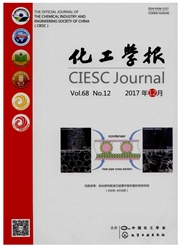

 中文摘要:
中文摘要:
针对油田污水污染物成分复杂、污染性强不适合膜法脱盐的特点,提出用机械蒸汽压缩蒸发(MVC)技术对油田污水进行脱盐处理的技术方案。建立了基于MVC的油田污水脱盐系统的工艺流程设计计算模型,系统分析了降膜蒸发器传热温差、油田污水温度和蒸发温度的影响。结果表明:传热温差是影响系统装置规模和运行电耗的控制因素,减小传热温差可以明显降低压缩机比电耗,付出的代价是系统比传热面积的增大;MVC系统的热力完善度高,无废热排放,油田污水温度越高,系统比传热面积减小;在其他条件允许的条件下,提高系统的运行温度有利于改善系统的性能。
 英文摘要:
英文摘要:
A mechanical vapor compression(MVC)based desalination system for oilfield waste water is proposed to combat the difficulties resulted from complicated and strongly polluting pollutants of the waste water in using membrane methods.The complete mathematical model for process simulation and design is developed for the MVC-based oilfield waste water desalination system and the influences of the heat transfer temperature difference of falling-film evaporators,waste water temperature and evaporation temperature on the system performance are analyzed.The results show that the temperature difference is the controlling factor that determines the specific heat transfer area and the specific compression work of the system.Reducing this temperature difference will directly decrease the specific compression work and increase the specific heat transfer area.Higher waste water temperature results in a slight decrease in the specific heat transfer area,which demonstrates that the system is highly perfect in thermodynamics.The results also show that increasing evaporation temperature may significantly improve the performance of the system.
 同期刊论文项目
同期刊论文项目
 同项目期刊论文
同项目期刊论文
 期刊信息
期刊信息
